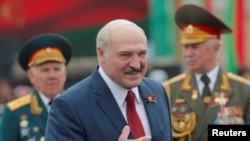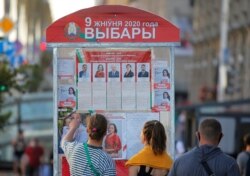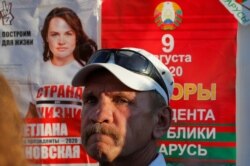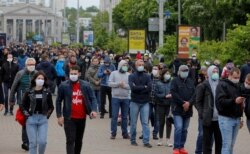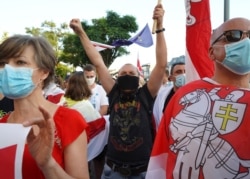In the closing days of the Belarus presidential election campaign, opposition candidates are holding mass rallies and incumbent President Alexander Lukashenko is visiting businesses, giving speeches to the Security Council and government – and lashing out at the news media.
During a meeting with campaign staff, Lukashenko railed at local and international media, saying the Belarussian edition of Russian daily Komsomolskaya Pravda “will soon turn into a tabloid” and accusing foreign outlets, including the BBC and Radio Free Europe/Radio Liberty, of being biased and calling for riots.
Lukashenko, who has been in power for 26 years, asked the Foreign Ministry to intervene.
“There is no need whatsoever to wait until the end of the election campaign. Get them out of here if they do not comply with our laws and call people to Maidans,” he said on July 23, referring to mass protests in Ukraine in 2013 over the country’s move away from the European Union.
In the months leading up to the August 9 vote, journalists and bloggers in Belarus have been arrested, harassed and even deported as Lukashenko faces an unexpectedly tough election amid discontent with the economy and his poor handling of the coronavirus pandemic.
The president, who says he tested positive for the virus, kept the country open and early on recommended fighting the virus with saunas and vodka.
Opposition presidential candidates were also forced out of the race, with two detained and a third — Valery Tsepkalo, a former ambassador to the United States — forced to flee to Russia, fearing arrest.
Media in Belarus already work under repressive conditions, with strict accreditation rules and access to independent news websites blocked. The country ranks 153rd out of 180 countries, where 1 is the most free, according to the World Press Freedom Index compiled by Reporters Without Borders.
“In Belarus, the situation with freedom of speech is traditionally bad,” Alexander Klaskovsky, head of analytical projects of the BelaPAN news agency, told VOA. “During election campaigns this situation becomes aggravated.”
Klaskovsky said journalists were bearing the brunt of a difficult presidential campaign for Lukashenko.
On August 5, police arrested a freelancer for the German agency Deutsche Welle twice in one day. And after a July 31 rally for opposition candidate Svetlana Tikhanovskaya in the city of Maladzechna, police detained a crew for the independent Belarusian-language station Belsat TV.
Tikhanovskaya stepped in as a candidate after the arrest of her husband, Sergei Tikhanovsky, a popular video blogger who runs the YouTube channel “Country to Live In,” and who was registered to run.
Earlier in the campaign, Sergei Tikhanovsky was the main irritant for authorities, said Klaskovsky.
“He traveled all over the country," Klaskovsky said. "In small towns, he would give the microphone to disadvantaged people blasting the authorities. And the authorities felt that it was dangerous, because their biggest fear is the street, since the election commissions are staffed with loyal people and the counting of votes is completely under state control.”
On May 6, authorities charged Sergei Tikhanovsky and seven others with “organizing and preparing actions that grossly violate public order.”
Boris Goretsky, deputy chair of the Belarusian Association of Journalists, said arrests and oppression of journalists have increased, with over 60 incidents recorded during the campaign.
“The authorities are afraid of freely disseminated information, as evidenced by the recent arrests of journalists after rallies,” Goretsky told VOA. “Authorities try to detain the maximum number of journalists so no one is there to provide video coverage and distribute it on the internet.
“After all, information is what motivates people to act,” he said.
In addition to the arrests, authorities are beating journalists at rallies and obstructing live broadcasts, said Natalya Radina, editor-in-chief of the news website Charter’97.
Klaskovsky, of BelaPAN, added that bloggers and administrators of public and Telegram channels working under the “Country to Live In” brand have been hit hard, but the pressure is also felt by independent news websites, news agencies and publications whose editorial offices are abroad.
These journalists are often not invited to press conferences or other official events, where the priority is given to state-owned press. And those covering mass gatherings risk being arbitrarily detained, having equipment broken or confiscated and, if they lack accreditation, being fined for “illegal fabrication of mass media products.”
“The rest of the press finds itself in an information vacuum,” Klaskovsky said.
The Belarus Embassy in Washington told VOA on Friday to send questions via email. The embassy did not respond to VOA’s emailed questions.
‘Under supervision’
Independent media in Belarus are still tightly controlled. Journalists need accreditation to access official events, and the State Security Committee — still known as the KGB, its Soviet-era name — regularly monitors the press, with officials calling reporters to discuss their work.
Because of these officials — described by some journalists as “supervisors” — “it is very difficult to determine the degree of independence of a local outlet,” said Irina Khalip, a Belarus correspondent for Novaya Gazeta, an independent Russia paper known for its critical and investigative coverage of Russian political and social affairs.
“All foreign journalists need to be accredited with the Ministry of Foreign Affairs. And this accreditation comes with lines you cannot cross,” Khalip said. “One step over and your accreditation is revoked."
In May, the Foreign Ministry stripped a Channel One correspondent of his accreditation and deported him to Russia. The ministry did not state the reason, but Channel One, a Russian state broadcaster, said it came one day after a segment on Belarus coronavirus cases.
Khalip works without accreditation, but says it comes at a cost.
“I cannot attend any press conference of a government official because no one will let me in there. But in this case, the editorial board decided, ‘Well, to hell with those officials!’ ” Khalip said. “There are streams, there are news agencies, if you need to quote somebody. Better to have a free correspondent.”
Internet freedom
With a stifled media, Telegram channels and video blogs are increasingly popular — and coming to Lukashenko’s attention.
“Lukashenko at all his meetings says that it is they who are to blame for everything,” Khalip said, adding that authorities at first did not know how to address it. “You can revoke the accreditation of a journalist, but what do you do with a YouTube channel?”
Authorities have stepped up the arrests and harassment of bloggers. But Khalip believes it’s a losing battle.
“It is possible to oppress a certain number of journalists located in Belarus, but it is impossible to fight the internet. Therefore, in my opinion, they have already lost this war.”
The journalist was convicted of rioting after the 2010 election and authorities jailed her husband, Andrew Sannikov, who ran as an opposition presidential candidate.
News websites based outside Belarus are a key source of information. Despite attempts by authorities to block the sites, readers are finding ways to access them online.
The Charter'97 website has been blocked for over two years, editor-in-chief Radina said. “But people have learned to bypass the blocking via virtual private networks [and] anonymizers, and still read us because they need accurate information.”
“It is impossible to completely cut off information, because these days not only journalists but everyone can record videos on their mobile phones and post them on the internet. Information on what happens in Belarus on August 9 and 10 will appear anyway,” Radina said.
Goretsky, deputy chair of the Belarusian Association of Journalists, said the internet, along with social media and Telegram channels, makes it faster and easier to share or access objective information.
“People no longer watch TV day and night; they watch YouTube channels. This gave birth to the phenomenon of Sergei Tikhanovsky, who created his own channel, which was popular with the older generation as well,” he said.
“While the government has been fighting all these years for print runs and compulsory subscriptions, independent publications have de facto taken over the internet," Goretsky said. “And although many of them do not have accreditation and cannot attend official events, they have several advantages, including the internet.”
This article originated in VOA’s Russian service.




